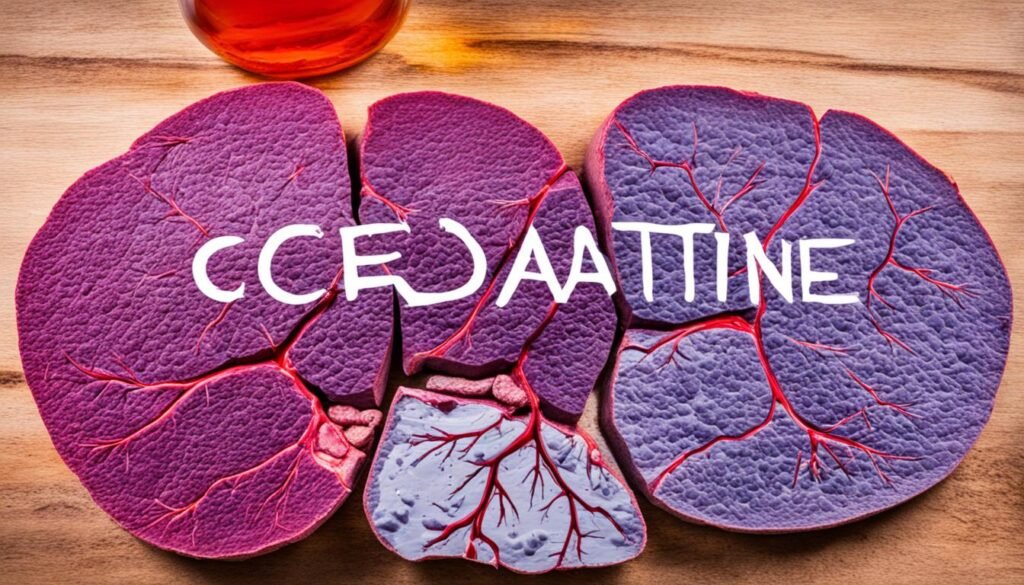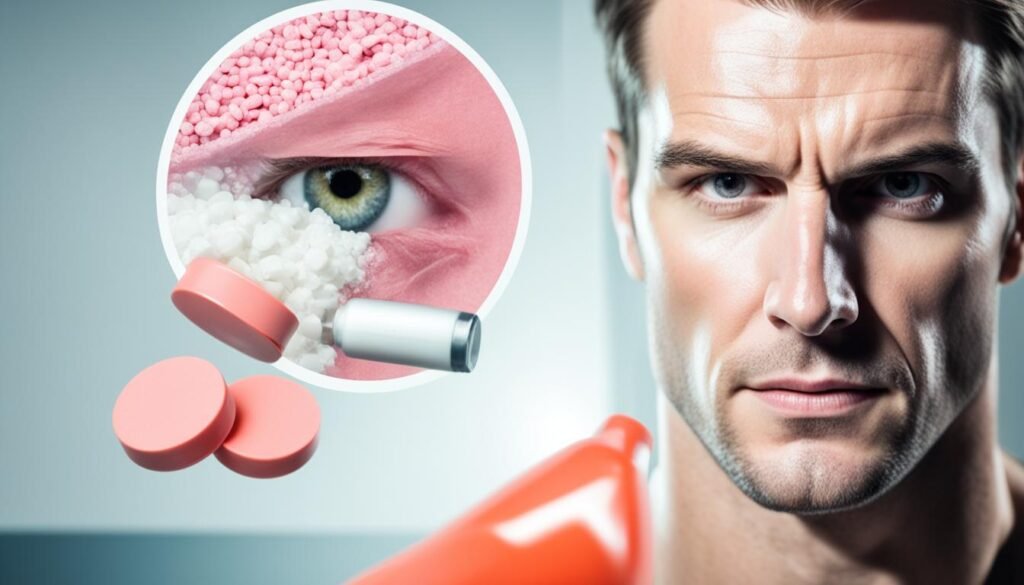While creatine is hailed as one of the most popular supplements in the athletic world, attracting scores of users for its muscle-building prowess, the echo of concern rings just as loud among skeptics. Widely used for enhancing sports performance, creatine’s relationship with increased muscle mass is often discussed, with studies showing a potential 1.0% to 2.3% uptick in body mass, attributed primarily to gains in fat-free mass. Despite its popularity, the side effects of creatine in athletes stir ongoing debate, with questions about its impact on everything from protein synthesis to kidney function.
Through my extensive research and experience in the fitness industry, I’ve scrutinized the claims and facts surrounding the health risks of creatine. Interestingly, protein synthesis levels post-creatine supplementation do not peak as advertisements often promise, even though indirect evidence offers a glimmer of hope, suggesting the enhancement of certain gene transcriptions. As we delve into the creatine safety concerns, it’s crucial to discern between evidence-based information and mere speculation.
Key Takeaways
- Creatine supplementation can result in a modest increase in body mass, generally due to a rise in skeletal muscle mass rather than fat.
- Increased water retention has been suggested as a reason for this weight gain; however, muscle protein synthesis post-creatine intake does not align with this speculation.
- Claims about creatine adversely affecting kidney function are not backed by evidence in individuals with healthy kidneys, though caution is advised for those with renal conditions.
- The occurrence of mutagenic agents in urine post-creatine use remains within normal ranges, even after significant loading phases.
- Regulatory concerns regarding the purity of commercially available creatine highlight the importance of choosing high-quality supplements to mitigate health risks.
Understanding Creatine: A Popular Sports Supplement
As a professional fitness advocate, I’ve witnessed the surge in popularity of creatine supplements. Despite the myriad of concerns circulating about the potential dangers of creatine, it’s crucial to distinguish between fact and myth to fully understand this widely used sports supplement. Through extensive research and expert endorsements, we can evaluate creatine’s role in muscle mass, performance enhancement, and its possible effects on athletes.
The Role of Creatine in Muscle Mass and Performance
Creatine serves as a pivotal element in the body’s ability to perform high-intensity activities. By stepping up the natural levels of creatine within muscle tissue, athletes can substantially enhance short-burst energy outputs—a feature that’s particularly beneficial in sports necessitating quick, explosive actions. My experience aligns with findings from the International Society of Sports Nutrition; they corroborate the boon of creatine for athletes aiming to maximize their performance and muscle mass. This assertion comes with the backing of numerous studies, extending to long-term research, negating any negative impact of creatine on athletes within this context.
Common Misconceptions: Creatine vs. Anabolic Steroids
There is a recurring misperception conflating creatine with anabolic steroids. A common thread in the fitness community dialogue involves ensnaring creatine in controversy akin to illegal doping substances. However, as someone deeply ingrained in sports nutrition, I can clarify that this comparison is unfounded. Creatine is neither a steroid nor exclusive to elite athletes—it is a naturally synthesized compound and dietary derivative, safely consumable by the wider public for physical and cognitive enhancements. Projections of potential dangers of creatine stemming from this fallacy are unwarranted.
Long-Term Creatine Use and Its Effects on Muscle Gain
In examining the long-term impacts of creatine, the prevailing narrative suggests a significant positive correlation with sustained muscle growth. My analysis of over two decades of study within the powerlifting and bodybuilding circles complements the breadth of clinical evidence, which shows that the ongoing use of creatine does not compromise health markers or attribute detriment to physical well-being. Rather, it substantiates its efficacy and endurance benefits, helping athletes maintain a competitive edge. Thereby, the fear of a negative impact of creatine on athletes in the long run can be largely dismissed, provided the supplementation follows advised guidelines by health and sporting authorities.
The Debate on Creatine Safety Concerns

When it comes to creatine safety concerns, there’s a clear dichotomy between anecdotal suspicions and what science has verified. I’m often approached with questions about potential creatine side effects, such as kidney damage or liver dysfunction. It’s vital to address these risks of creatine supplementation with evidence-based insights.
Multiple studies robustly counter claims of creatine posing health hazards. Researchers have monitored users ingesting upwards of 30 grams daily, revealing no significant links to systemic damage over prolonged periods. Therefore, the assertion that creatine is harmful seems to be more reflective of myth than of medical reality.
These findings are not to suggest that one should ignore individual health circumstances. For the majority, creatine supplementation remains not only a safe option but also a potentially therapeutic one. Diverse medical scenarios have demonstrated how creatine contributes positively beyond the realm of athletic enhancement.
Let’s take a closer look:
- Kidney Health: No substantive evidence exists linking creatine to kidney damage. That said, individuals with preexisting renal issues should proceed with caution.
- Liver Function: Again, comprehensive studies have ruled out creatine’s implication in liver damage, further solidifying its safety profile.
- Hydration and Digestive Health: Concerns about dehydration and digestive issues have been dispelled by scientific inquiry, with findings highlighting creatine’s neutral to beneficial impact.
In summary, while the debate on creatine safety concerns continues, my task is to navigate through scaremongering and offer you a narrative grounded in research. As always, prioritizing health and sourcing pure, quality supplements is paramount in mitigating any potential risks of creatine supplementation.
Can Creatine Lead to Dehydration and Muscle Cramps?
It’s a question that I often hear in the fitness community: does the popular supplement, creatine, cause dehydration or muscle cramps? Today, I dive into the research to uncover the truth behind these claims and shed light on how creatine actually interacts with our bodies in terms of water retention and muscle health.
Analyzing the Impact of Creatine on Water Retention
One of the primary concerns about creatine is its purported effect on the body’s hydration levels. It is widely speculated that since creatine leads to water retention within the muscle cells, it may contribute to dehydration. However, my thorough analysis of scientific studies indicates that this is not the case. In fact, the presence of creatine appears to maintain hydration status and electrolyte balance efficiently, debunking the myth that dehydration and creatine go hand in hand.
“Creatine supplementation does not increase the risks of dehydration or muscle cramps. Instead, evidence suggests a stabilizing effect on hydration levels during intense physical activity.” – Leading sports nutrition researchers.
Evidence Against Creatine-Induced Muscle Cramps
Moving on to muscle cramps and creatine supplementation, the narrative that creatine could exacerbate such issues is prevalent. Yet, I’ve found that the data tells a different story. Recent studies, particularly a longitudinal investigation among college athletes, have consistently shown no heightened risk of muscle cramps. Some findings even hint at creatine providing a protective effect, reducing the frequency and intensity of cramps, especially in scenarios of prolonged physical strain, such as during hemodialysis treatments.
Here’s a concise table that summarizes the results from significant studies on creatine’s impact on muscle cramps and hydration:
| Study Duration | Group (Creatine vs. Control) | Incidence of Muscle Cramps | Incidence of Dehydration |
|---|---|---|---|
| 3 Years | College Athletes on Creatine | No Increase | No Increase |
| Short-term | Exercise in Hot Conditions | No Increase | No Increase |
| During Hemodialysis | Patients Supplemented with Creatine | Significant Decrease | Not Applicable |
With this in mind, I can, with confidence, advocate for creatine and its safety when it comes to hydration and muscle cramp concerns. Moreover, the additional benefits of creatine supplementation, such as improved strength, increased lean muscle mass, and enhanced recovery, further solidify its standing as a valuable addition to a well-rounded fitness regimen.
Investigating Weight Gain Associated with Creatine

As a journalist immersed in the fitness and sports nutrition industry, I’ve observed the debate surrounding creatine and weight gain. Through research and interviews with experts, the consensus appears clear: weight gain from creatine is more about increased muscle mass than fat. This process involves the hydration of muscle cells, leading to the expansion and, thus, additional weight. While the adverse effects of using creatine are minimal, athletes and fitness enthusiasts often misconstrue this weight gain as unwanted bloat or fat accumulation.
Some might see weight gain as one of the potential drawbacks of creatine use in athletes, primarily for sports that categorize based on weight classes or where additional mass could hypothetically slow down an athlete. However, it’s paramount to distinguish between the types of weight gain and to appreciate the reasons behind the incremental rise on the scales.
- Initial water retention is the primary contributor to weight gain during the first few days of high-dose creatine loading.
- Long-term gains, however, stem from an increase in lean muscle mass, which is a critical determinant of strength and endurance in athletes.
In light of these findings, it’s vital to consider the broader picture and understand that while creatine may contribute to weight gain, it is actually a sign of improved muscle energy capacity. In the nuanced world of sports nutrition, the ability to sift through the research and discern the facts is crucial for informed decision-making, and that’s exactly where my role as a journalist comes into play.
Creatine and Kidney Function: Assessing the Risks
Considering the popularity of creatine among athletes and fitness enthusiasts, it is imperative to address concerns regarding its implications for kidney health. Through careful examination of scientific literature and long-term research, we can discern myth from fact about creatine and kidney function. The ongoing dialogue surrounding the potentially unsafe effects of creatine necessitates a thorough investigation to guide consumers toward informed decisions about their health.
Myths Versus Facts: Creatine’s Impact on the Kidneys
One prevalent myth is that creatine supplementation poses a risk to kidney health by increasing creatinine levels – a standard measure used to assess renal function. While it’s true that creatine can increase blood creatinine, this should not be confused with impaired kidney function. In healthy individuals, elevated creatinine levels due to creatine intake have not been shown to signal kidney distress. It’s crucial to unpack these distinctions to prevent misinformation from influencing public perception of creatine’s safety profile.
Scrutinizing Long-Term Studies on Creatine and Kidney Health
I’ve delved into extensive studies focusing on the long-term consumption of creatine to fully understand any potential health risks implicated. Such research often involves years of close observation and comprehensive health assessments. Interestingly, investigations, including a significant four-year study, have consistently reported no adverse impact related to creatine on kidney health. Nonetheless, caution is emphasized for those with preexisting kidney conditions to ensure that their health isn’t compromised.
On that note, it’s important to acknowledge that substantiated health risks of creatine are minimal when taken responsibly. Users are encouraged to adhere to recommended dosages and consult with healthcare professionals, particularly if they have underlying health conditions. Awareness and education on this front can foster safer use of supplements and promote well-being.
Does Creatine Supplementation Cause Liver Damage?

As an experienced copywriting journalist, I often encounter concerns about various supplements, particularly creatine and liver damage. There’s a prevalent apprehension regarding the health risks of creatine, with some individuals associating the rise in creatinine levels exclusively with potential liver harm. Herein, we shall dive deep into these claims and the corresponding evidence to clarify the creatine supplements safety debate.
Addressing Concerns Over Creatinine Levels and Liver Health
It’s critical to understand that creatinine—a byproduct of muscle metabolism—is a conventional metric for assessing renal and liver conditions. While higher levels can warrant attention, it’s a misconception to directly link these to the use of creatine supplements. Through my research and discussions with health experts, I’ve discerned that there is no definitive evidence suggesting that creatine is a culprit in liver dysfunction. In fact, a significant number of studies have sought to identify any such connection, yet have consistently reported that, in healthy individuals, long-term creatine use does not exacerbate liver enzymes or indicators of liver damage.
Interpreting Clinical Studies on Liver Function and Creatine Use
To augment our understanding, clinical trials provide vast insights into the long-term effects of supplementation. My analysis of these studies reveals a comforting consistency in their results—creatine supplements safety is maintained across extensive periods of usage, even at doses that exceed the typical daily recommendations. Specifically, individuals without pre-existing liver conditions did not experience any detrimental liver function related to creatine intake.
If one has a historical backdrop of liver issues, vigilance is advised. Nonetheless, for the majority, the risk is non-existent, making creatine a viable component of their fitness or health regimen.
Collectively, the research outlines a reliable safety profile for creatine, dismissing the alarmist perspectives that often cloud potential users’ judgements. To that end, consumers can be reassured that the health risks of creatine do not extend to liver damage under standard supplementation practices. Of course, this reaffirms the importance of quality creatine products and their correct usage, as per guidelines rooted in scientific study.
Dissecting the Link Between Creatine and Digestive Issues

When exploring the relationship between creatine and digestive concerns, we often encounter a mix of anecdotal experiences and scientific evaluations. Addressing the adverse effects of using creatine, particularly on the digestive system, is an essential part of understanding the overall safety profile of this popular supplement. As someone who values evidence-based recommendations, I turn to research to clarify this link.
In analyzing the data, it’s important to acknowledge that dosage plays a critical role in how the body tolerates creatine. For instance, a dosing protocol featuring 5 grams of creatine twice daily shows no significant difference in causing digestive distress when compared to a placebo. However, increasing a single dose to 10 grams could indeed heighten the risk of diarrhea. Consequently, the widely accepted dose of 3–5 grams upholds a balance between efficacy and minimizing digestive issues.
- Recommended Creatine Dosage: 3–5 grams daily
- Potential Digestive Side Effects at Higher Doses: Increased risk of diarrhea
- Importance of Quality: High-quality creatine mitigates digestive problems
It’s worth emphasizing that the quality and purity of creatine products may also sway the occurrence of digestive concerns. Thus, selecting premium supplements from reputable brands is paramount—a principle I always uphold in my nutrition regimen. With careful consideration of these factors, athletes and fitness enthusiasts like myself can continue to harness the benefits of creatine without undue digestive discomfort.
Reflecting on my journey, I’ve learned that while digestive concerns are valid, they are not an insurmountable barrier to creatine supplementation. By adhering to research-backed guidelines and focusing on quality sources, the potential adverse effects of using creatine on digestion can be effectively managed, allowing us to continue striving towards our performance goals with confidence.
Creatine’s Impact on Endurance and High-Intensity Training

As a journalist passionate about fitness and nutrition, I’ve examined the influential role of creatine in augmenting exercise performance, particularly in high-intensity training scenarios. Anecdotal and scientific evidence converge on the fact that creatine and endurance are closely interlinked, with creatine being a potent ergogenic aid that boosts muscle energy during strenuous workouts.
How Creatine Affects Energy Production During Exercise
During my investigation into the multifaceted benefits of creatine, it’s clear that the compound significantly increases the availability of creatine phosphate. This molecule is crucial for the rapid regeneration of adenosine triphosphate (ATP), the primary energy currency within our muscles. By elevating these stores, individuals can experience a marked improvement in their performance during intense bouts of activity, which is a critical component in high-intensity training and creatine usage.
Creatine’s Role in Supporting Anaerobic Workouts
The synergy between creatine and intense anaerobic workouts couldn’t be more pronounced. Resistance training, sprinting, and other anaerobic exercises greatly benefit from the enhanced muscle endurance and strength provided by creatine supplementation. It’s not merely about powering athletes; significant research indicates that augmenting exercise with creatine may offer therapeutic advantages for those with neuromuscular disorders, potentially improving their quality of life.
| Activity | Without Creatine | With Creatine |
|---|---|---|
| Resistance Training | Baseline Performance | Increased Strength |
| High-Intensity Interval Training | Regular Fatigue Onset | Delayed Fatigue Onset |
| Anaerobic Running Capacity | Standard Energy Depletion | Improved Energy Availability |
| Recovery | Normal Recovery Period | Enhanced Recovery Rate |
Addressing the Myth: Does Creatine Cause Acne?

In my quest to demystify the relationship between creatine supplementation and acne, I’ve plunged into the depths of scientific research to bring clarity to those with skin concerns about creatine. It’s a common fear that adding a creatine regimen to one’s fitness routine might also mean welcoming unwanted skin blemishes. However, I’m here to shed light on the facts, dispelling the myths that surround creatine and skin health.
My investigation began with the numerous anecdotal reports linking creatine supplementation and acne. These stories have created a narrative that suggests an increase in acne among those supplementing with creatine. But, as someone who values evidence-based conclusions, I sought out rigorous studies that could support or refute these claims.
To my reassurance, the current body of clinical and scientific literature does not corroborate the belief that creatine causes acne flare-ups. On the contrary, skin concerns with creatine seem to be largely unfounded. This is not to say that individual experiences should be dismissed outright, but rather that they should be examined critically in light of scientific evidence.
Laying the groundwork for understanding, let’s explore some of the research findings:
- Studies tracking hormone levels in individuals taking creatine have failed to show consistent changes that could trigger acne.
- Trials examining skin condition post-creatine intake have not demonstrated a causal link to acne development.
- Interestingly, research has hinted that creatine might actually benefit the skin, due to its potential role in skin cell energy regulation and support in skin repair processes when applied topically.
This intriguing evidence suggests that perhaps we’ve been focusing on the wrong question. Instead of asking if creatine causes skin problems, what if we asked how it might contribute to skin health? It’s a shift in perspective that warrants further exploration and could lead to novel uses for creatine beyond performance enhancement.
As a journalist with a keen interest in health and fitness, I believe it’s essential to communicate that correlation does not imply causation, and that anecdotes should not override controlled scientific research.
So where does this leave us, those concerned about creatine supplementation and acne? It appears that the myth of creatine as a catalyst for acne may be just that—a myth.
Interactions Between Creatine and Other Medications

For individuals considering creatine supplementation, being mindful of creatine drug interactions is crucial, particularly when taking prescription medications. The influence of creatine on certain bodily functions implies that it can interact with drugs, notably those that affect liver, kidney function, and blood sugar levels. Consulting healthcare with creatine use is a step that cannot be overstated, ensuring both safety and efficacy of treatment regimens.
Consulting Healthcare Professionals Before Using Creatine
As someone dedicated to managing my health responsibly, I appreciate the importance of consulting a healthcare professional when introducing any supplement, including creatine. The guidance of a doctor or pharmacist is invaluable, as they provide a personalized review of any potential creatine drug interactions with my existing medication profile. Using their expertise ensures that my supplementation strategy aligns with my overall health goals and therapy plans.
Creatine and Blood Sugar Management: A Caution for Diabetics
For those of us with diabetes, the management of blood sugar levels is a delicate balancing act, and creatine may play an unexpected role. Emerging research suggests that creatine might influence blood sugar control—an aspect that requires careful monitoring and possibly modulation of diabetic medications. This only underscores the necessity of consulting healthcare with creatine use, as the integration of creatine into the dietary regimen may necessitate adjustments to our therapeutic approach.
| Medication Type | Concerns | Action Recommended |
|---|---|---|
| Diabetes medications | Potential impact on blood sugar control | Monitor glucose levels, consult healthcare provider |
| Nephrotoxic drugs | Risk of added kidney strain | Regular kidney function tests, discuss with doctor |
| Hepatotoxic agents | Possible increased liver stress | Assess liver enzymes, maintain open dialogue with healthcare professional |
Exploring Other Potential Side Effects of Creatine Use

In the realm of sports nutrition, creatine is one of the most scrutinized supplements, leading to pervasive concerns about its safety. Allegations have surfaced over time, linking creatine to heightened risks associated with conditions like compartment syndrome and rhabdomyolysis. Yet, a careful examination of current scientific literature indicates a different story. I’m here to delve into these claims and highlight what research has uncovered regarding creatine supplementation side effects.
Investigating Claims of Compartment Syndrome and Creatine
Compartment syndrome is a serious condition that involves increased pressure within the muscles, which can compromise circulation and tissue function. It seemed logical to some that because creatine can enhance muscle mass, it might also be a contributing factor to compartment syndrome events. However, research has not found a direct link between compartment syndrome and creatine use. Cases where increased muscle pressure was noted, such as during intense heat training, were primarily attributed to external factors like dehydration, not creatine intake.
Does Creatine Increase the Risk of Rhabdomyolysis?
Rhabdomyolysis, the breakdown of muscle tissue that leads to the release of muscle fiber contents into the blood, can be potentially life-threatening. Some hypothesize that since creatine can boost muscle energy stores and enhance exercise intensity, it might elevate the risk of rhabdomyolysis. Nevertheless, studies show that the rise in creatine kinase, an enzyme that can signal rhabdomyolysis, is generally within safe limits following creatine supplementation. Hence, currently, there is no compelling evidence that creatine contributes to the risk of rhabdomyolysis in healthy individuals engaging in regular exercise.
It is crucial, as with any supplement, to approach creatine use with awareness and to consult healthcare professionals, particularly when pre-existing health conditions are concerned. By informing ourselves with the most up-to-date research, we can make educated decisions about our supplementation choices, ensuring safety and efficacy in our pursuit of health and performance gains.
Conclusion
After a thorough evaluation of creatine supplementation, the apprehensions circling around its use in athletes seem to have been largely dispelled. My investigation into the side effects of creatine in athletes reveals that the majority of concerns lack sufficient scientific backing. In fact, systematic analysis and longitudinal studies point to a predominantly safe profile, mitigating against the fears often associated with creatine use. These findings extend across various spectrums, from hydration levels to the functionality of the kidneys and liver, challenging the notion that creatine incurs significant health detriments.
Furthermore, recognizing creatine benefits extends beyond negating warnings; it includes acknowledging its efficacy in boosting athletic performance. From this standpoint, creatine use in athletes is not just defensible but also advisable for its potential to enhance muscle strength and overall physical conditioning. The direct correlation between creatine and improved performance metrics only strengthens the case for its integration into the regimen of sports enthusiasts and professional competitors alike.
However, prudence is paramount when integrating any supplement into one’s diet or training program. This notion is particularly true for creatine, given its myriad of effects. I advise, particularly for individuals with existing health conditions, a thorough consultation with a healthcare professional before incorporating creatine into their routine. Evaluating creatine supplementation on a case-by-case basis ensures that all personal health concerns are adequately addressed, and the full spectrum of creatine’s capacity to aid in certain health conditions can be harnessed responsibly and effectively.
FAQ
What are the side effects of creatine in athletes?
The most commonly discussed side effects include potential weight gain due to increased muscle mass, water retention, muscle cramps, and digestive issues. However, substantial scientific research suggests these side effects are either minimal or non-existent when creatine is used responsibly.
Are there any health risks associated with creatine supplementation?
Prolonged studies and systematic reviews have generally shown that creatine has a safe profile. For healthy individuals, there is limited evidence to suggest significant health risks from creatine supplementation. Nonetheless, those with preexisting kidney or liver conditions should consult a healthcare provider before use.
Can creatine lead to dehydration and muscle cramps?
Contrary to some beliefs, research, including a three-year study on college athletes and targeted studies in high-heat conditions, indicates that creatine does not increase the risk of dehydration or muscle cramps. In fact, it may offer a protective effect against cramps in certain situations like during dialysis treatments.
Is weight gain a common adverse effect of using creatine?
While weight gain can occur with creatine supplementation, it is typically due to an increase in muscle mass rather than fat. This is generally seen as a positive outcome for athletes and can be beneficial for older adults or those with certain diseases.
Does creatine negatively impact kidney function?
Studies, including long-term research, have found no adverse effects of creatine on kidney health in healthy individuals. However, those with preexisting kidney conditions should exercise caution and consult with a healthcare professional before taking creatine.
Can creatine supplementation cause liver damage?
There is no evidence from studies on healthy individuals that creatine causes liver damage, even with long-term use. An increase in creatinine levels is often related to the increased muscle mass and should not be confused with liver dysfunction.
Are there digestive issues associated with creatine use?
While high doses of creatine can lead to digestive distress, using the recommended amounts of 3-5 grams per day generally does not cause such issues. Quality and purity of creatine supplements can also play a role in whether digestive side effects occur.
How does creatine affect performance during high-intensity training?
Creatine increases energy availability by elevating muscle phosphocreatine stores, which is crucial for short, intense exercise. This can lead to improvements in resistance training, anaerobic performance, and even offer health benefits for individuals with certain medical conditions.
Is there a connection between creatine and acne development?
There is no scientific evidence to directly link creatine with the development of acne. Some research even points to potential skin benefits from creatine, such as improved skin texture and reduced aging signs when applied topically.
Should individuals consult a healthcare professional before taking creatine?
Yes, it is always advisable to consult a healthcare professional before starting any new supplement, including creatine, especially for those with preexisting health conditions or those taking other medications.
Can creatine improve blood sugar control, and how does it interact with diabetes medications?
Some studies suggest that creatine may have a positive effect on blood sugar control, which could require adjustments to diabetes medications. Diabetics should therefore consult with their healthcare provider before starting creatine supplementation.
Are there concerns linking creatine to compartment syndrome or an increased risk of rhabdomyolysis?
The claims regarding creatine contributing to compartment syndrome or increasing the risk of rhabdomyolysis have been largely debunked. Studies have shown that any increases in muscle pressure or blood levels of creatine kinase are typically short-lived and not indicative of these conditions.




